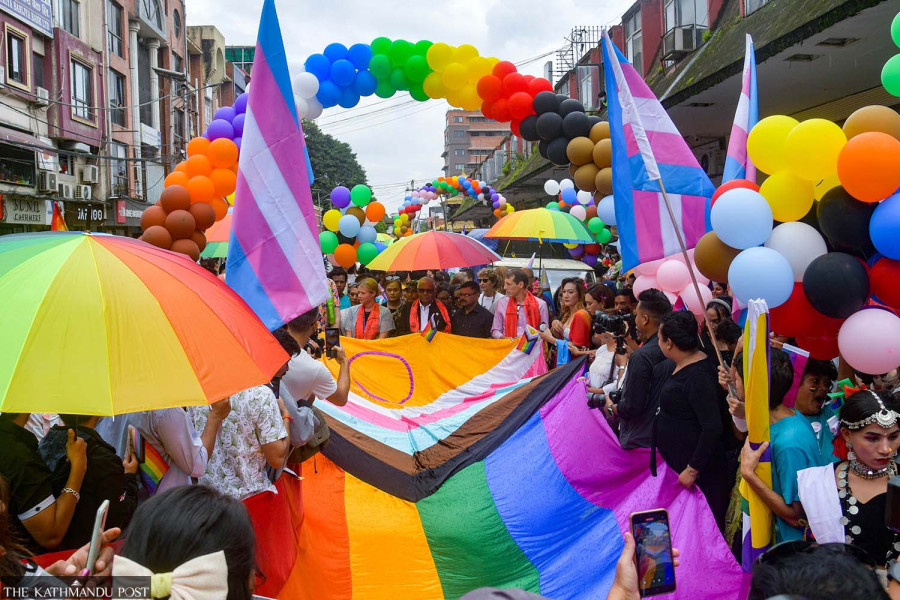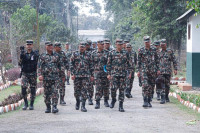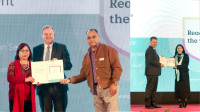National
Nepal’s queer couples caught in red tape
Nearly two years after the Supreme Court allowed same-sex marriage registration, queer couples in the country still face discrimination and inconsistent enforcement.
Aarati Ray
On June 28, 2023, Nepal’s Supreme Court issued an interim order mandating the government to temporarily register same-sex marriages. Queer-rights activists welcomed the verdict as “historic”. Five months later, the country made headlines worldwide for registering the same-sex marriage of Maya Gurung and Surendra Pandey.
Despite optics, however, the couple didn’t have an easy time registering their marriage. Both the Kathmandu District Court and the Patan High Court had initially rejected their application, citing the absence of a federal law. Only after Gurung’s home district of Lamjung issued a temporary certificate were they able to register their marriage on November 29, 2023.
Their case marked the first public evidence of how inconsistently and arbitrarily the Supreme Court’s order was being applied. Nearly eighteen months on, the recent case of Sushila Ramtel and Pramila Tamang suggests little has changed, as queer couples are still resisting bureaucratic red tape to register their marriage.
For Ramtel and Tamang, what should have been a simple process became a struggle, marked by harassment, rejection, and even police-enforced separation, before they were ultimately compelled to knock on the doors of Singha Durbar, the seat of the federal government.
On May 8, Ramtel and Tamang approached ward 6 office of Sunkoshi Rural Municipality in Sindhuli with a government-issued same-sex marriage registration directive.
Instead of support, they encountered hostility. Ward Secretary Dandapani Bhandari dismissed the directive as “fake” and “impossible”. Claiming ignorance of legal procedures, he demanded 15 days to “study the case”.
Meanwhile, Tamang’s family, refusing to accept the relationship, filed a missing persons report at the district police office in Lalitpur. The couple was forcibly separated by police in Lalitpur, where officers reportedly verbally harassed them and, ignoring Tamang’s pleas that she felt unsafe, handed her over to her family.
Tamang was confined to her room, cut off from communication, and her family even attempted to take her to a jhankri (faith healer) to ‘cure’ her so-called ‘disease’ of marrying a woman.
Tamang escaped from her home on May 12. With the help of WOREC Nepal and the queer rights organisation MayaKo Pahichan, the couple reached the Department of National ID and Civil Registration in Singha Durbar the following day.
There, Mukesh Kumar Keshari, director of the registration unit, called the ward office and assured the couple their registration would proceed smoothly.
Even then, on May 14, when they returned to the ward office, Bhandari again refused to cooperate. “Even if I have to lose my job, I won’t register a marriage between two girls,” he reportedly said. Only after a second call from Keshari did Bhandari reluctantly comply.
He has since declined to comment on the allegations of verbal abuse and homophobia.
The Department of National ID and Civil Registration lacks official data on the number of queer marriages in Nepal.
According to Keshari, provisional registrations are not entered into the nationwide online database. “Until a final decision replaces the provisional one, there’s not much more we can do,” he said.
Queer rights organisations have stepped in to fill the gap. The Blue Diamond Society (BDS) has documented 17 queer marriages.
“This may not reflect the full picture,” said Suman Nepal, a representative of the BDS. “Our data includes only couples who’ve had contact with us. We’re continuing our mapping, but the government must take the initiative for updated records.”
On April 24, 2024, the Ministry of Home Affairs issued a directive authorising all the local bodies to register same-sex and other non heterosexual marriages in separate record books, along with the format for a provisional registration certificate, which is still available on the website.
But many ward officials remain either unaware of the directive or decline to register these marriages, showing that legal directives in Nepal are only as powerful as the willingness of local authorities to enforce them.
Advocate Sacistha Shrestha, who has helped register a few queer marriages, believes bureaucratic inertia and moral policing remain major barriers.
“Even though they are aware of same sex unions through social media, local officials often challenge couples’ certainty about their choice and actively discourage them,” Shrestha said.
“What they don’t see,” said Tamang, “is that going to a ward office is already a bold act, openly telling society that you’re queer. No one does that unless they’re certain.”
Another major hurdle is the officials’ lack of practical understanding of the registration process.
“It’s one thing for ordinary citizens to be unaware,” adds Ramtel, “but when government officers, legally responsible for registering marriages, don’t know what to do, that represents the state’s negligence as well as a gap between the central and local governments.”
Unlike heterosexual couples, who can register their marriage in 15-20 minutes without legal help, queer couples need activists or lawyers to counter officials’ moral policing and lack of knowledge on the provisional marriage registration certificate.
This makes the process costly and drawn out. For example, the marriage registration of Prajeet Budhathoki and Joseph Foster Ellis’s marriage took 3-4 days, and another case in Sankhuwasabha took a full week for advocate Shrestha.
“Hiring advocates, travelling across regions—it’s all exhausting and costly,” Ramtel said. “Altogether, we ended up spending nearly Rs40,000.”
The provisional nature of the Supreme Court’s order is ambiguous for binational couples.
Generally, marriages between a foreign national and a Nepali citizen are registered through the courts, but courts have refused to register same-sex marriages, calling them “provisional” until formal laws are passed.
Provisional certificates are issued by wards, but consular offices refuse to recognise them, preventing access to benefits like marriage visas. For example, Joseph, an American, can’t help his Nepali partner, Prajeet, get a US marriage visa because the consular office refused to recognise their marriage, saying ward offices don’t have such authority.
Yet another problem is the inconsistent registration forms across Nepal. Many local offices still use gendered forms meant for heterosexual couples, forcing queer couples to pick ‘bride’ and ‘groom’ roles that erase their true identities. For example, Ramtel and Tamang were registered as ‘bridegroom’ and ‘bride’, not ‘bride’ and ‘bride’.
Director Keshari acknowledges these challenges.
“Many of these problems can only be resolved with a final court verdict that results in proper laws and policies,” said Keshari. “We try though… starting this fiscal year, we are conducting multiple training sessions for local officials on various topics, including same-sex marriage.”
However, these limited efforts from the government have largely failed. Bimala Gurung, programme officer at Mitini Nepal, explains that many queer couples have abandoned marriage registration altogether due to persistent bureaucratic obstacles, discrimination and financial and psychological burdens.
Moreover, the current certificate doesn’t grant full marriage benefits like property rights, adoption, or tax exemptions.
“Many fear that provisional rights can be revoked at any time,” Gurung said. “And the low number of registration records of queer couples could be used by homophobic lawmakers to argue against permanent protections.”
The fight for marriage equality has been a long one. In December 2022, Mitini Nepal and the Forum for Women Law and Development had filed a petition demanding a legal revision of the civil code, changing the definition of marriage from a union between “a man and a woman” to “a union between two individuals.”
The petition further advocates for equal rights for queer couples as those enjoyed by heterosexual couples.
But following a hearing on January 4, 2023, the court had postponed the case six times, citing “a shortage of constitutional bench judges”.
“We have another hearing scheduled for June 4,” Gurung said. “I just hope it won’t be postponed again… marriage equality is something the queer community has long fought for.”
Advocate Shrestha said that if the government makes a provision, it should be clear and uncompromising. “But today, couples face uncertainty at every step,” she said. “What should have been a fundamental right has become a luxury.”




 8.26°C Kathmandu
8.26°C Kathmandu














